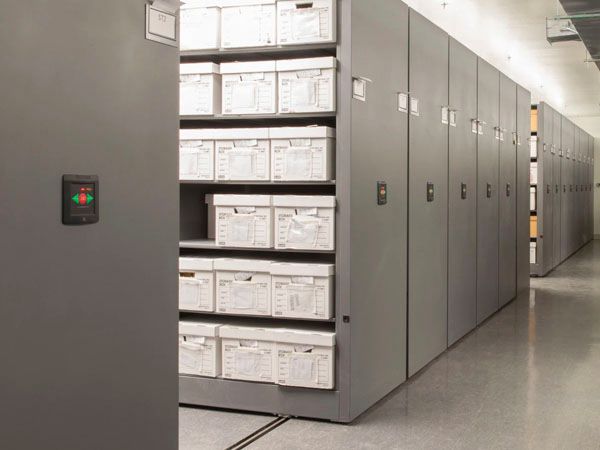Floor Loading 101
How to plan for High-Density Mobile Storage System installations.
By involving Spacesaver’s storage experts in your project’s early design phases, we can help save both time and money for you and your clients. For example, an architect at the College of Charleston worked with their local Spacesaver consultant to design the university’s library with the capacity for high-density shelving, even though it wasn’t needed at the time of construction. That foresight opened up renovation possibilities ten years later.

Floor Loading Considerations
For even more insight, we’d encourage you to download our Floor Loading Considerations Brochure.
Floor Loading Considerations
For even more insight, we’d encourage you to download our Floor Loading Considerations Brochure.

Our experts have worked with architects and their teams on countless new and existing construction projects for a variety of applications. We know there are plenty of factors to consider when implementing a high-density mobile storage system within a space. We’ve highlighted a few of these components below.

The High-Density Concept & Carriage
Spacesaver’s High-Density Mobile Shelving systems maximize the capacity for storage by providing movable storage shelves and aisles. The versatile Spacesaver carriage with its welded uniframe construction, is designed to provide exceptional rigidity, resulting in minimal distortion and structurally square carriage members under heavy loads.
Floor Load Considerations
The magnitude of a floor-load capacity required will be contingent on what’s being stored. For instance, typical floor requirements for paper files or books will be 125-200 pounds per square foot (psf), while museum applications may require 275-300 psf depending on the number of shelf tiers and type of floor system.
Rail Flexibility & Placement
The heaviest floor loads can be distributed through the flexibility of Spacesaver’s rail layout, and there are countless options for distributing these loads by adjusting rail placement and spacing.
Footprint & Distribution
For a high-density mobile storage system, the Impact Area Footprint is the combined area of the storage system plus its aisle space. Loads from the shelves of the system are transferred to the carriages, which are transferred to the wheels, then the rails, and ultimately, the structure of the building. Keep in mind that the aisles are subjected to pedestrian loads (15 psf minimum), which must be considered in conjunction with the storage system loads. In terms of rail loads, Spacesaver High-Density Mobile Shelving systems are planned with approximately equal rail loads. However, it’s also possible to develop unequal rail loading if conditions are more advantageous.

Maximizing Capacity, Reliability, and Accessibility
Maximizing Capacity, Reliability, and Accessibility

Orientation & Relocation
When evaluating floor load, initial layouts may yield conditions that don’t meet your specific criteria. Spacesaver’s rail size selections offer a unique ability to be oriented over load-bearing points – so satisfactory loading can be accomplished. When relocating a system of a certain weight to a bay’s allowable load capacity – systems can be repositioned over an adjacent bay and an additional rail can be attached so the weight can be distributed evenly.
Post-Construction Modifications
There are several types of structural modifications, supplements, and suspended systems that can be utilized to reinforce the beams and joists that support a high-density mobile storage system. All framed floor systems are subjected to deflection when load is applied to the floor system, and the amount of deflection is proportional to the applied load. Buildings with large bays can have enough deflection to cause a high-density mobile storage system to drift. Spacesaver has developed a patented positioning brake, which will prevent a system from drifting, as well as patented anti-tip systems that meet all code requirements for buildings in areas that are prone to seismic activity.Structural & Seismic Considerations
Next Up in A&D



How can American Rescue Plan funds be used in my school or workplace?
Read On
Cover story emphasizes Spacesaver’s flexibility and growth.
Read On